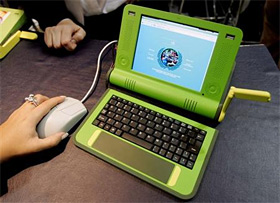 |
 |
 |
 Technology News | January 2006 Technology News | January 2006  
UN Body Backs $100 Laptop for World's Kids
 Reuters Reuters


| | A woman uses a $100 hand-cranked laptop computer at the United Nation's World Summit on the Information Society (WSIS) in Tunis, November 17, 2005. The United Nations has thrown its weight behind a project to place a $100, hand-cranked laptop computer in the hands of millions of schoolchildren around the globe. (Reuters/Francois Lenoir) |
Davos, Switzerland - The United Nations has thrown its weight behind a project to place a $100, hand-cranked laptop computer in the hands of millions of schoolchildren around the globe.

The United Nations Development Programme (UNDP) will sign a partnership agreement with the head of the project, Massachusetts Institute of Technology's (MIT) Nicholas Negroponte, in the Alpine ski resort of Davos on Saturday, officials said.

Davos is hosting the annual meeting of the World Economic Forum, a gathering of top politicians, economists and business executives.

The aim is to provide the lime-green machines free of charge to children in poor countries who cannot afford computers of their own.

Under the agreement, UNDP and the non-profit One Laptop per Child organization set up by MIT Media Lab chairman Negroponte, will work together with local and international partners to get the machines to targeted schools in least developed countries.

The goal is for governments or charitable donors to pay for the laptops, although children will own them.

About the size of a textbook, the machines developed at MIT can set up their own wireless networks and operate in areas without a reliable electricity supply, since they can be powered by hand cranking.

Proponents say the devices, which have been welcomed by United Nations Secretary General Kofi Annan, will be a boon for education.

But not everyone is convinced.

Chip-maker Intel Corp Chairman Craig Barrett said last month the world's poor would not want the $100 "gadget", since it will have a limited range of programs and capabilities. | 
 | |
 |



